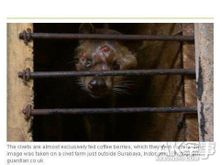The process of feeding civets
The process of feeding civets

Indonesia's "Kopi Luwak" tastes delicious, mellow, sweet and slippery, and its unique smell is even more unforgettable. It is known as gourmet coffee, which is delicious because of its scarcity. It costs NT $6,000 for half a pound. But recently, British media have revealed that Indonesian shops are suspected of abusing Kopi Luwak-producing civet cats (commonly known as masked palm civet), keeping them in tiny cages and feeding them large quantities of coffee beans to force them to increase production.
After eating the coffee beans, the civets complete the fermentation in the stomach, destroying the protein of the coffee beans, producing short peptides and more free amino acids, reducing the bitter taste of the coffee. Because the coffee beans cannot be digested, the civets excrete them and become civets coffee after washing and baking. An eyewitness went straight to a cat shit coffee shop in Sumatra, Indonesia, and found a female civet kept in a narrow cage in the back column of the store, while other smaller civets were kept in more than 20 small cages hidden on the roof and forced to gorge on coffee beans. Traffic, a conservation group that monitors wildlife sales, says similar farms are rising year by year in Southeast Asia, leading to higher and higher mortality rates for civet cats.
Important Notice :
前街咖啡 FrontStreet Coffee has moved to new addredd:
FrontStreet Coffee Address: 315,Donghua East Road,GuangZhou
Tel:020 38364473
- Prev

Is a one-way venting can really necessary for coffee beans?
I saw a sealed can with one-way exhaust on TB. I haven't seen it before. I only know that the bag has exhaust. Is this jar better for preserving coffee beans than coffee bags?
- Next

Coffee story
The legend of Kalde the legend of coffee originated in Ethiopia. In the 67th century BC, Kalde, a goat herding boy, lived in a mountain village in Abyssinia, a steep mountain range in Ethiopia. One day, he saw a strange sight. It was the goats who suddenly made a fuss like a ball. Caldy observed the goat.
Related
- How did the Salvadoran coffee industry develop in Central America?
- What exactly does the golden cup extraction of coffee mean?
- The Origin of Coffee flower
- [2023 Starbucks World Earth Day] there are more meaningful things besides free Starbucks coffee!
- What kind of coffee is there in Spain? 9 Flavors of Spanish Coffee
- Aromatic African coffee| Kenya's coffee culture and historical production area
- Liberica Coffee Bean knowledge: the characteristics of Liberian Coffee beans of the three original species of Coffee beans
- The origin and formula of Spanish latte introduces the taste characteristics of Bombon coffee in Valencia, Spain.
- How to adjust the solution of over-extracted coffee
- What is the tasting period of coffee beans? What is the period of coffee and beans? How should coffee wake up and raise beans?

